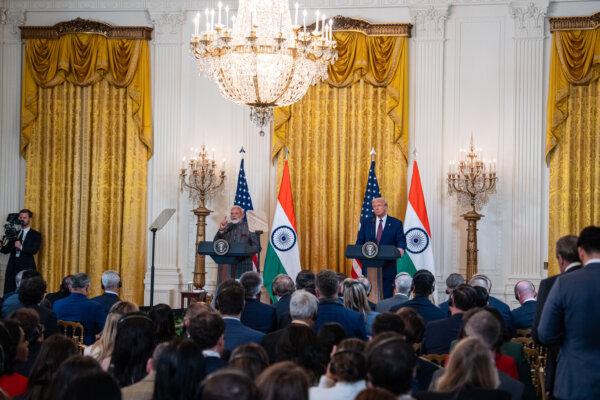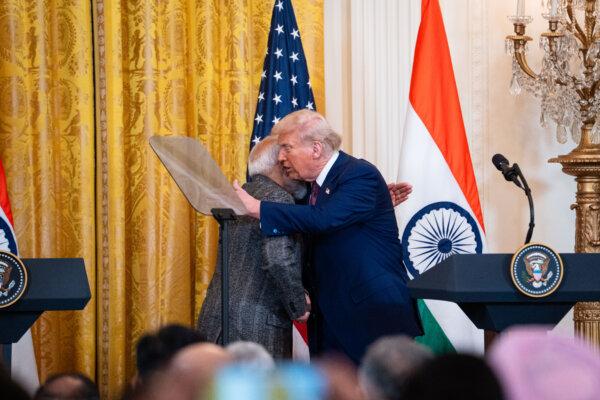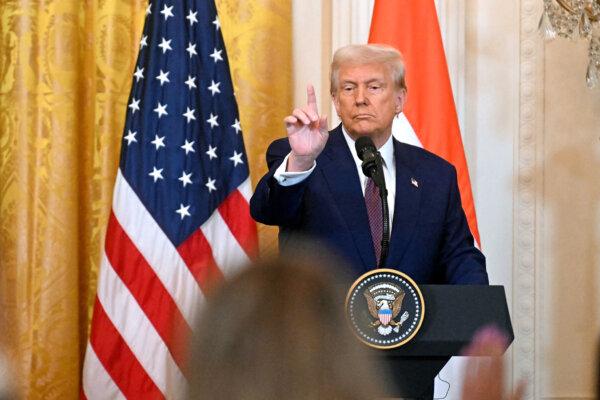Modi and Trump Share Common Vision During White House Meeting
Trump expressed enthusiasm for crafting “wonderful trade deals” that would benefit both India and the United States, while Modi emphasized the idea of a “mega partnership” between their countries.
NEW DELHI—During their meeting last week at the White House, U.S. President Donald Trump and India’s Prime Minister Narendra Modi clearly focused on their nations’ priorities.
In a spirit of mutual concern, the leaders of the two largest democracies in the world addressed various issues, leading to strengthened bilateral relations amidst rising geopolitical anxieties, particularly regarding China, according to analysts.
A joint statement issued on February 13 highlighted that the meeting “reaffirmed the strength of the India–U.S. Comprehensive Global Strategic Partnership, grounded in mutual trust, shared interests, goodwill, and the strong engagement of their citizens.”
Former Indian national security adviser S.D. Pradhan remarked to The Epoch Times, “Modi’s engagement with Trump marked a significant milestone in the evolving partnership between the two nations. A pragmatic and friendly dialogue culminated in ‘wonderful deals,’ with complex matters resolved for shared advantage.”
Aparna Pande, director of the Hudson Institute’s Initiative on the Future of India and South Asia, noted that even though Trump had announced reciprocal tariffs shortly before meeting Modi, the dynamics shifted positively afterward.
Pande stated, “[Trump] also highlighted India’s high tariffs, large trade deficit, and limited market access. Nevertheless, during his press conference, the President mentioned India’s agreement to lower these tariffs, enhance accessibility, and that both sides were exploring a potential trade deal.”
Modi informed reporters of the ambitious goal to more than double bilateral trade to $500 billion by 2030, an initiative they referred to as “mission 500” in their joint statement.
Trump reiterated his commitment to crafting “wonderful trade deals” for India, encouraged after Modi addressed his concerns regarding trade disparities and tariffs, according to Pande.
Pradhan noted that since the fiscal year 2025-26, India has shown a willingness to reduce duties.
“In addition to costly American motorcycles and batteries, India has lowered taxes on agricultural products, aligning with Trump’s fair-trade policies,” he said.
India is expected to reciprocate the United States’ confidence-building measures by agreeing to purchase oil and gas from the U.S. to alleviate Trump’s concerns. “Details are likely to materialize in the months ahead,” he added.

Indian Prime Minister Narendra Modi and U.S. President Donald Trump speak during a press conference at the White House in Washington on Feb. 13, 2025. Madalina Vasiliu/The Epoch Times
‘MIGA’ and ‘MAGA’
The assertive yet collaborative ambiance at the meeting was highlighted when Modi referred to the India-U.S. relationship as a “mega partnership.”
“Using an American expression, my vision for a developed India is to ‘Make India Great Again,’ or ‘MIGA,’” Modi declared at a joint press conference in the White House’s East Room on Thursday.
“When America and India collaborate, that is, when it’s MAGA—combined with MIGA—it transforms into a mega partnership for prosperity. It’s this spirit that elevates our objectives to new heights,” asserted the Indian Prime Minister.
Pradhan added that both nations resolved to enhance their relationship through a “global comprehensive strategic partnership” for economic advancement. Modi aptly remarked that the meeting aimed to build on the achievements of Trump’s first term, he said.
After their discussions, Trump confirmed that India would increase its purchases of U.S. oil and gas, as well as military equipment, including F-35 fighter jets.
The joint statement emphasized a “deepening convergence” in defense, trade and investment expansion, energy security, technology and innovation, multilateral cooperation, and strengthening people-to-people ties.
Experts noted that these defense agreements and the commitment to purchase more U.S. oil and gas convey a significant geopolitical message to China and Russia, respectively.
“The announcement regarding increased defense sales to India, including the potential acquisition of F-35 fighter jets, is also aimed at sending a message to China,” Pande observed. Furthermore, purchasing additional oil and gas from the U.S. will assist India in decreasing its reliance on Russia, indirectly signaling to China,” she added.
Pradhan stated that Trump’s tariff decisions regarding China and his dialogues with Russia are advantageous for India.
“China has remained central in the discussions,” he remarked.
According to Pradhan, the United States is implementing tariffs to ensure compliance from China with international standards. Simultaneously, Trump’s prospective meetings with Russia and China to curtail military expenditures “align with India’s interests.”

U.S. President Donald Trump greets Indian Prime Minister Narendra Modi during a press conference at the White House in Washington on Feb. 13, 2025. Madalina Vasiliu/The Epoch Times
Terrorism and Indo-Pacific Affairs
One notable outcome from the meeting that garnered praise in Indian media was Trump’s agreement to extradite Tahawwur Rana, implicated in the 2008 Mumbai attacks, currently detained in a Los Angeles facility.
Trump stated, “I am pleased to announce that my administration has approved the extradition of … one of the very evil people of the world.”
Rana, a former Pakistani veteran, was associated with Pakistani-American terrorist David Coleman Headley, a key conspirator in the attacks, which resulted in the loss of 175 lives in India.
Pradhan mentioned that the extradition reflects the United States’ attentiveness to India’s national security needs and will enhance mutual trust.”
“India’s worries regarding escalating terrorism were well understood by Trump’s team, who assured comprehensive cooperation. Trump even declared that the U.S. would be extraditing a highly dangerous terrorist,” noted Pradhan.
Both analysts emphasized that a positive stance regarding cooperation in the Indo-Pacific and Trump addressing India’s concerns relating to Bangladesh set the groundwork for deeper geopolitical collaboration.
“The affirmative reference to the Quad, the IMEC [India–Middle East–Europe Economic Corridor], and the ongoing technological collaboration in AI and critical technologies were unmistakable signals to China. The President made it clear that Quad is a security alliance aimed at maintaining peace and stability in the Indo-Pacific,” Pande asserted.
Pradhan further stated that this meeting also opened avenues for enhanced nuclear cooperation between India and the United States.
This time, Modi and Trump reached an agreement to collaboratively construct American-designed nuclear reactors in India under the framework established in 2007, aiming to meet India’s clean energy demands.
“Assurances were given regarding nuclear energy cooperation while commending India’s legal reforms that facilitate U.S. participation in the nuclear sector,” Pradhan remarked.

U.S. President Donald Trump takes questions during a joint press conference with Indian Prime Minister Narendra Modi, in the East Room of the White House in Washington, on Feb. 13, 2025. Jim Watson/AFP via Getty Images
Bangladesh and Khalistan Concerns
Prior to the meeting with Modi, Trump was queried by a reporter regarding the role of the “deep state” in Bangladesh, which experienced the ousting of Sheikh Hasina’s regime that lasted 16 years last year. The ensuing student-led “monsoon revolution” led to an interim administration under Muhammad Yunus.
This political upheaval, marked by violence, resulted in grievous human rights violations against minorities including Hindus, Buddhists, and Christians. In October, Trump condemned the violence, stating it would have “never happened on my watch.”
Hasina is currently in India, and the political instability has strained relations between New Delhi and Bangladesh’s new government. Tensions along the long and porous India-Bangladesh border have also heightened.
Responding to the question, Trump said, “There was no involvement from our deep state. This is something that the prime minister has been working on for a long time… I will leave Bangladesh matters to the prime minister.”
Pradhan suggested that Trump’s remarks indicated a U.S. non-involvement in anti-India actions.
During the joint press conference on February 13, Trump faced a query about the Khalistan movement, which advocates for a separate state for Sikhs in Punjab, Northern India. Some of the group’s activists were seen outside the White House holding anti-Modi slogans before the meeting, a story that received more coverage from Pakistani media than Indian outlets.
The Khalistan movement comprises several groups with historical ties to violence, many designated as terrorist organizations by India. Indian authorities have accused Khalistani activists of orchestrating attacks on Indian consulates in the UK, Canada, and the United States, while the U.S. and Canada have criticized India for targeting Khalistani proponents on its soil.
While Trump did not provide a direct answer, he hinted at the complexities in India-U.S. relations under the Biden administration, noting that both countries would collaborate on matters of crime.
The two leaders agreed to “enhance law enforcement cooperation to take decisive action against organized crime organizations, including narco-terrorists, human traffickers, arms traffickers, and other entities that pose threats to public and diplomatic safety and security, as well as the sovereignty and territorial integrity of both nations,” as stated in their joint statement.





